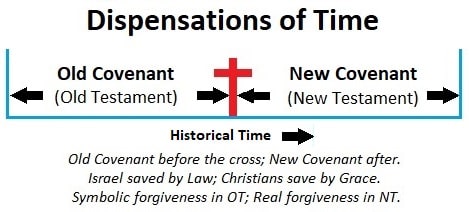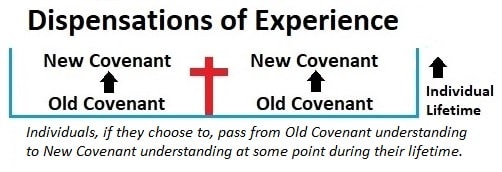Dispensation Meaning in the Bible

understanding of the character of God and the Gospel.
Dispensation meaning. In the Bible, periods of time during which God has dealt with people in different ways. People have variously identified up to about nine different dispensations. But are there really so many? Note that the actual uses in the Bible of “dispensation” (4 in Paul’s letters) have a somewhat different meaning.
Traditional Legal Model – Dispensation meaning God has dealt with people, as a whole, in different ways during different periods of history. This is related to covenant theology which considers various covenants, most simply, the Old and the New which, of course, are also seen as separated in time – before and after the cross.
Biblical Healing Model – Dispensation meaning there are stages in how God deals with each individual but those are dispensations of individual experience rather than dispensations of historical time. They are distinct periods (independent of historical events) in each person’s life but are consecutive in time – before and after conversion.
Dispensation Meaning in Popular Theology
Dispensationalism is a theological system that maintains that God works differently with different sets of people during the different periods of Biblical history. The “father” of the Dispensationalism theory of understanding the Bible was the clergyman John Nelson Darby (1800 – 1882).
Closely related to dispensations is the concept of covenants (or agreements) between God and man usually thought of as the Old Covenant (in the Old Testament) and the New Covenant (in the New Testament). The transition from Old to New is understood to be the event of the cross.
“Most Christians hold that the Old Testament has been superseded or abrogated and replaced with the New Covenant, which is the only one of the biblical covenants that remains valid today.” (https://en.wikipedia.org/wiki/Dual-covenant_theology)
Most believe that the two covenants represent two different dispensations (periods of historical time) separated by the death of Jesus. Believers before the cross are considered to be “under law,” while believers after the cross are “under grace.”
Forgiveness before the cross has been understood as symbolic or provisional or dependent upon the sacrifice of the cross to make it valid.
Dispensation Meaning According to the Bible
A problem with dispensations in time is that it has God treating people differently at different times in history. However, the everlasting covenant is different in that salvation and grace have been equally available both before and after the cross. The old and new covenants therefore are not dispensations of time periods but of individual experience.
“Dispensation” as Used in the Bible
It turns out that dispensations, as discussed above, are not how the Bible actually uses the word. Here are the four verses that use “dispensation” in the King James version:
“For if I do this thing willingly, I have a reward: but if against my will, a dispensation of the gospel is committed unto me.” (1 Cor 9:17)
“That in the dispensation of the fulness of times he might gather together in one all things in Christ, both which are in heaven, and which are on earth; even in him:” (Eph 1:10)
“If ye have heard of the dispensation of the grace of God which is given me to you-ward:” (Eph 3:2)
“Whereof I am made a minister, according to the dispensation of God which is given to me for you, to fulfil the word of God;” (Col 1:25)
The “dispensation” referred to by Paul (author of the verses above) had to do with his actions of dispensing or distributing the gospel. A better term might be “stewardship” which is much more commonly used in Bible translations than “dispensation.”
Webster’s 1828 Dictionary
Dispensation (noun)
- Distribution; the act of dealing out to different persons or places; as the dispensation of water indifferently to all parts of the earth.
- The dealing of God to his creatures; the distribution of good and evil, natural or moral, in the divine government.
- The granting of a license, or the license itself, to do what is forbidden by laws or canons, or to omit something which is commanded; that is, the dispensing with a law or canon, or the exemption of a particular person from the obligation to comply with its injunctions.
- That which is dispensed or bestowed; a system of principles and rites enjoined; as the Mosaic dispensation; the gospel dispensation; including, the former the Levitical law and rites; the latter the scheme of redemption by Christ.
(https://webstersdictionary1828.com/Dictionary/dispensation)
While actual uses of the word in the Bible are closest to definition 2 above, the meaning discussed on this page is regarding definition 4.
God Initiates the Covenant
In the Old Covenant experience, God said that He would do what was needed (“I will …”) seven times:
“Wherefore say unto the children of Israel, I am the LORD, and I will bring you out from under the burdens of the Egyptians, and I will rid you out of their bondage, and I will redeem you with a stretched out arm, and with great judgments: And I will take you to me for a people, and I will be to you a God: and ye shall know that I am the LORD your God, which bringeth you out from under the burdens of the Egyptians. And I will bring you in unto the land, concerning the which I did swear to give it to Abraham, to Isaac, and to Jacob; and I will give it you for an heritage: I am the LORD.” (Exo 6:6-8)
The people’s response seemed, at first, to be in hearty agreement with God:
“And all the people answered together, and said, All that the LORD hath spoken we will do. And Moses returned the words of the people unto the LORD.” (Exo 19:8)
“And he took the book of the covenant, and read in the audience of the people: and they said, All that the LORD hath said will we do, and be obedient.” (Exo 24:7)

The problem was that they were trusting more in what they thought they could do than in what God had promised to do for them. In only a few days and, in fact, while Moses was meeting with God to receive the Tables of the Law, they broke their promises in the golden-calf incident.
They, in the old covenant experience, were learning (or should have been learning) the condition of their own hearts. God recognized their condition and promised that He would provide the Remedy:
“For finding fault with them, he saith, Behold, the days come, saith the Lord, when I will make a new covenant with the house of Israel and with the house of Judah:” (Heb 8:8)
So, the problem was with the people (their faulty promises), not with the law.
A New Dispensation Means a New Understanding
“Behold, the days come, saith the LORD, that I will make a new covenant with the house of Israel, and with the house of Judah: Not according to the covenant that I made with their fathers in the day that I took them by the hand to bring them out of the land of Egypt; which my covenant they brake, although I was an husband unto them, saith the LORD:” (Jer 31:31-32)
In fact, His remedy involved the same law, with the difference being that those with that law written on their hearts would relate to it differently than those who saw it merely as a list of restrictions:
“But this shall be the covenant that I will make with the house of Israel; After those days, saith the LORD, I will put my law in their inward parts, and write it in their hearts; and will be their God, and they shall be my people.” (Jer 31:33)
They would begin to see it not as commands but as promises:

God is speaking of the experience of “the house of (spiritual) Israel” – the true people of God. When they, on an individual level, come to understand what God has done and is yet promising to do for and in them (and of their personal need of dependence on Him), the idea of achieving salvation through works of the flesh should disappear from their thinking.
Paul referred to the understanding of this new reality:
“In that he saith, A new covenant, he hath made the first old. Now that which decayeth and waxeth old is ready to vanish away.” (Heb 8:13)
“By calling the healing plan “new,” God was simply making it clear that the symbolic plan was no longer needed to help enlighten the mind about him; and what is no longer needed will soon disappear.” (Heb 8:13, The Remedy New Testament)
The old experience can fade in the thinking of a converted person as they realize that God never required sacrifices in order to grant forgiveness and that He freely forgives every sin – and always has. The change is much more about our understanding of God than it is a change in His dealing with us.
The old covenant can “vanish away” for the converted but it still has its place in the life of the unconverted. It is not about before or after the cross. Essentially, it is about before or after the paradigm shift from thinking of God and the gospel in the Traditional Legal Model to thinking of His character and the gospel in terms of the Biblical Healing Model.
This is the reason for the Character of God and the Gospel Glossary. Once a person understands enough of the terms according to their true Biblical uses, an appreciation of the awesome character of God changes the thinking of the mind and the attitudes of the heart and they can enter into a true new-covenant relationship.
Return to the Character of God and the Gospel Glossary Index
Return to the Home Page

March 23, 2023 @ 7:22 pm
Thank you so much pastor Ray and God’s character team for providing good resources of God’s word in every situation for our questions and answers. We are so blessed to learn the truth of God’s character and we impressed with it and sharing with others. Thanks for wonderful inspiring books in your website. May it reach all souls for building God’s Kingdom.
Get ready and get ready for His second coming.
March 23, 2023 @ 7:32 pm
And thank you Evans and your team for your work in translating materials into your local Ekegusii language. May many people in Kenya and beyond learn of His wonderful character. God bless.